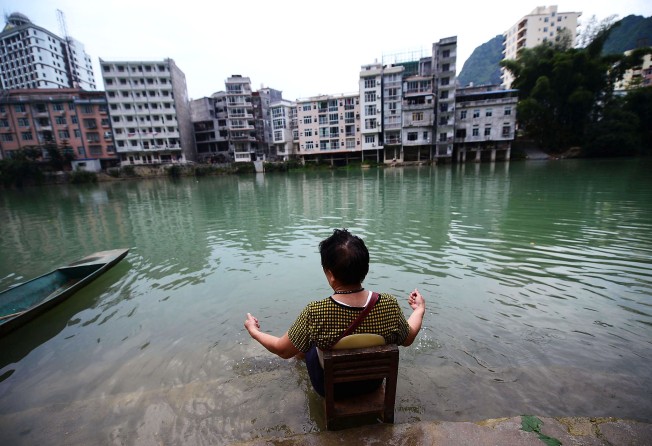
Chinese county of eternal youth under threat from gravely ill seeking cures
A region of Guangxi famous for the longevity of its residents is now under threat from an influx of gravely ill people seeking cures of last resort

Bama, a county tucked amid the green rivers and humid jungle of central Guangxi province, is famed for its centenarians. Scientists have studied their DNA in search of clues to the villagers' longevity, entrepreneurs have marketed their rice and bottled their water, and tourists have marvelled at people twice their age striding up slopes at dawn to work in far-off fields.
Lately Bama has attracted a different type of visitor - people battling life-threatening diseases, in many cases cancer, who have nowhere else to turn after hospital treatments and traditional medicine have failed. They come in the belief that copying the habits of the centenarians and living in an unsoiled environment can help them with their illnesses.

"No one could say when … cancer patients first started to move here and battle their diseases," said Li Li , a 53-year-old writer who has been struggling with bladder cancer for years.
"I came here for the first time last January and already found tens of thousands of migrants here, all suffering from fatal diseases," Li said. "I make friends with so many fellow companions in misfortune here. About 60 per cent of them are cancer patients and the rest suffer from other severe chronic illnesses."
Bama's reputation for its healthy, long-living villagers extends back centuries. The Jiaqing Emperor, who reigned during the Qing dynasty (1644-1911), was so inspired by a resident said to be 142 years old that he wrote a poem in the person's honour.
According to official statistics from last year, the county had 81 centenarians out of a total population of about 240,000 locals, one of the highest such rates in the world.
In the eyes of the medical pilgrims, Bama's residents must be doing something right.
"We come from provinces across the country. Most of us have spent nearly all our savings and tried various types of surgery and treatments, but still have no way to get well," Li said. Living in Bama was their last hope against dying, he said.
The migrants reason that leaving towns and cities - where residents battle smog, the rivers are tainted by factory discharges and supermarkets sell food laced with pesticides or growth hormones - and adopting a more wholesome lifestyle in Bama can help them fight their illnesses.
The area's underground water contains several minerals that are believed to be beneficial to health; the lush jungle has also provided air that is unusually rich in oxygen. Due to a lack of cultivated land, villagers eat coarse grains such as beans and yellow corn instead of flour and rice as their staple.
They must also climb mountains or walk to get to their fields, some of which are kilometres from their homes. This lifetime of hard work has given them strong muscles and bones. One can often see people in their 80s and 90s doing farm work.
But the onslaught of arrivals has changed Bama, and its fame is only drawing in more sightseers. More than 180,000 tourists visited the area over the week-long national holiday last year, a figure that was 42 per cent higher than the previous year's.
Local tour guide Li Huan said the average price of a hotel room had risen from 60 yuan (HK$76) to 300 yuan.
"But it's still hard to book a room during the holiday," she said. "Two years ago, Bama didn't even have light traffic. And now the villages are full of parked cars from all over the country. There's no doubt, the number of visitors has been much larger than last year."
Li Li agrees the lifestyle of the villagers is in flux. "Actually, Bama's residents are eager to learn how to make money and live like city people," he said. "The young people are busy building houses and then renting rooms to migrants with illnesses. The centenarians have learned the best way to make quick money is by taking pictures with tourists.
"The old people seldom eat meat, let alone seafood or dairy products. But now you can buy these foods at every wet market in Bama. Many young people have now quit farming to make a living through tourism. They have started to learn playing cards and mahjong, which they love."
The changes, though, would not deter tourists, he said. "Bama is still cleaner than every place in developed parts of the county with their petrochemical factories, mines and pollution," he said. "Young people are giving up the good habits and traditions that produced the centenarians."
He noted that the term "cancer village" had become an everyday expression on the mainland.
"That's why Bama is such a hot new spot for people."